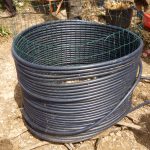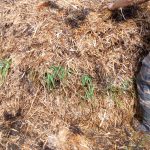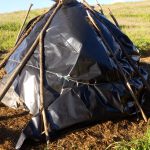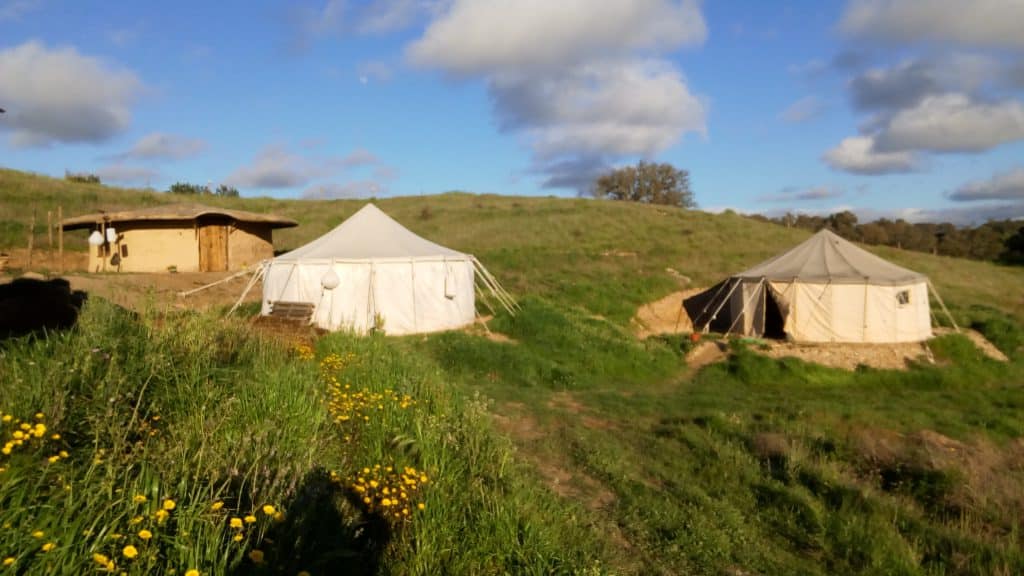
Within the context of sustainable place-shaping, rural development and bottom-up initiatives, I went to follow a Permaculture Design Course (PDC) in a rural area in Southern Portugal. Permaculture is derived from ‘permanent agriculture’ and ‘permanent culture’ and is based on holistic design in order for people to live harmoniously in nature and provide all their needs. The Permaculture Research Institute further explains that: “permaculture integrates land, resources, people and the environment through mutually beneficial synergies – imitating the no waste, closed loop systems seen in diverse natural systems. Permaculture studies and applies holistic solutions that are applicable in rural and urban contexts at any scale. It is a multidisciplinary toolbox including agriculture, water harvesting and hydrology, energy, natural building, forestry, waste management, animal systems, aquaculture, appropriate technology, economics and community development” (Permaculture Research Institute, 2018). I was very intrigued by the approach and felt it was very relevant for my work which revolves around rural development strategies based on local resources. Therefore I decided to follow a course here in Portugal, where I am based as part of the SUSPLACE network. While looking at the possible courses, I came across multiple projects, farms and communities, both managed by Portuguese and foreigners. Portugal seems to have attracted many foreigners that want to experiment and start projects related to sustainable living. The course I followed took place at Azula, a community project started in 2016 by two young families that, amongst other things, want to give to their children a safe and inspiring place to grow up. The course was facilitated by Surplus, a Permaculture collective which the course teachers Lola and Kyle are part of.
PDC and reconnection with nature
The project focuses to be an inspiring place where guests can come and stay and take in the beautiful landscape and connect with nature, for volunteers to help in the farm tasks and learn regenerative agriculture practices and for Azula to become an educational space where workshops (yoga, natural building, organic gardening etc.) and PDC’s are taught. The PDC course has been a very empowering and eye opening experience, which touched intellectual, emotional and practical topics, also thanks to the wonderful atmosphere and dedicated and knowledgeable teachers. The first day started with understanding the ethics and principles of permaculture, where the underlying ethics Earth care, People care, Fair share provide the foundations. As mentioned above, permaculture touches on several topics as exemplified in the permaculture flower below, showing the different topics and subtopics, all interrelated.
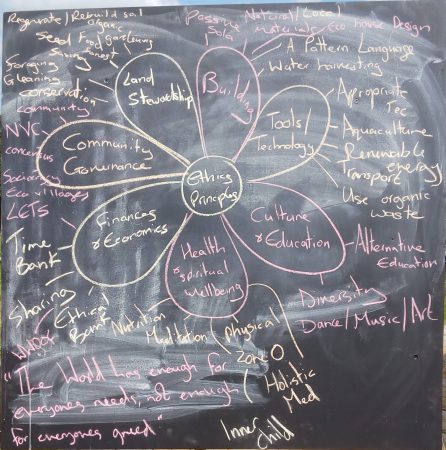
The schedule was quite intensive, having both theoretical and practical sessions. The practical sessions were both “getting hands dirty”, such as gardening, making a compost shower and natural building, but also intellectual, as developing various design projects, with a final real case study design project as the last examination. Throughout the course we were always reminded that nothing in nature is isolated, so we should practice looking at the bigger picture through holistic thinking and the importance of understanding systems and patterns.
The compost shower and the importance of closing (poop) loops!
I will share a small practical example of the course, that I found empowering. We harnessed the heat power of nature through compost (decomposed organic material), by constructing a “compost shower”. The idea behind it is very simple, as it is ingenious. The compost pile, about 1.5 meter in height and 2 meters in width, was made from manure, poop from the compost toilets we all used, grass clippings, food scraps and straw. These are all local (waste) resources, except a plastic sheet to cover the compost, a rubber tube for water and a metal wire to keep it all together. Bringing all these organic materials together, the composting process starts, where an aerobic biological process and micro-organisms decompose all the elements. This process makes heat, which can reach 60 degrees C and the tube, which is inside the compost, heats the water that is in it, allowing you to have a hot shower without the need of gas or electricity for a water boiler.
We constructed this in about 3 hours with a group of 15 people, and, as small as the example may be, for me was a good illustration on how we can decentralize and use local resources for our daily activities. The heat will work for about a year, after that the composting process finishes and the compost becomes hummus, which is then applied as a natural fertilizer to the soil for the vegetable garden, closing the loop! Nothing is wasted and there are multiple functions being served. A further application of the concept, although more complicated and in anaerobic conditions, is the ability to make bio-gas for cooking.
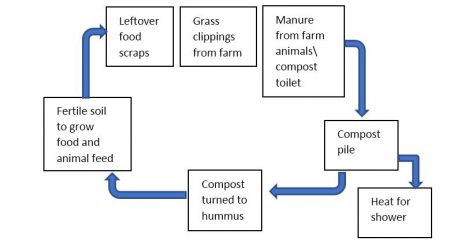
The course gives fruitful insights on different hands-on techniques for living sustainable, which together with the theoretical aspect have stimulated many people to create permaculture inspired projects in rural areas in Portugal, as can be seen by the amount of PDCs being offered and sustainable farms. These are good examples of bottom-up initiatives for rural development that revolve around sustainable living and can further create rural networks of vibrant communities. There are many articles, books and blogs written about the problems of the world, what we (as society and as individuals) should be doing for sustainability. Yet, in my opinion, practice and hands-on experiences are the way to inspire and lead by example. I found the PDC empowering in giving me the initial tools and knowledge to live sustainable, think in a holistic manner and inspiring others to do so as well.

